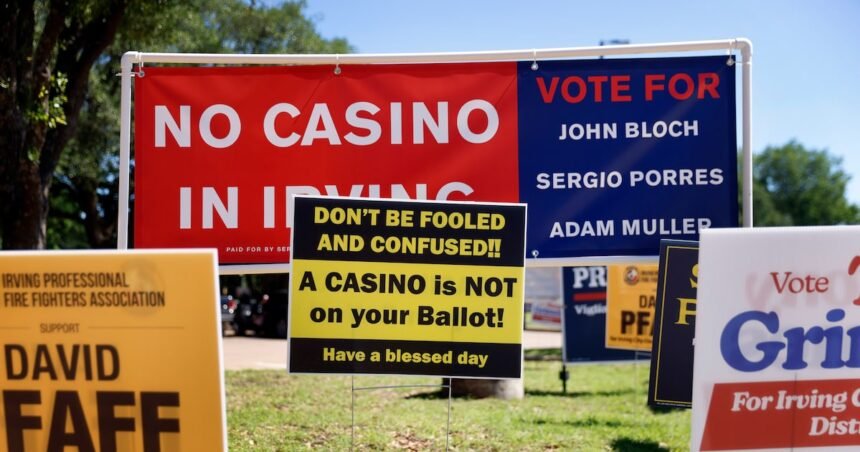A phone number tied to a “dark money” group that spent more than $160,000 to influence a recent Irving City Council election also appears on lobbying disclosures filed in Dallas by a registered lobbyist for Las Vegas Sands Corp., according to disclosures reviewed by The Dallas Morning News.
The phone number, listed in both city and state filings, suggests a potential link between Las Vegas Sands and the Lone Star Conservative Action Fund, a 501(c)(4) social welfare organization, which is not required to disclose its donors under state law.
Earlier this year, Sands unveiled a proposed “destination resort” near the old Texas Stadium site in Irving before public opposition led the casino giant to ask City Hall to drop a portion of a proposed zoning ordinance that included gambling.
The six-figure sum — a significant amount for what are typically low-turnout, low-profile contests — from the Lone Star Conservative Action Fund went toward signs, mailers and advertising for candidates in three races. Two of the candidates backed by the group, Tony Grimes and Priscilla Vigliante, lost on election day; the third, David Pfaff, is headed to a runoff on June 7.
Repeated calls and messages to the phone number went unanswered as of Tuesday. Efforts to reach John Buxie, the registered Las Vegas Sands lobbyist who listed the number in disclosure filings with the city of Dallas, also were unsuccessful. Sands spokespeople did not provide comment when reached by The News.
Filings with the Texas Ethics Commission show the Lone Star Conservative Action Fund, the “dark money” group, has supported candidates only in Irving municipal races since its inception earlier this year, though it has sometimes sent messaging on behalf of other state lawmakers.
The group’s website says it is “dedicated to advocating for strong conservative values,” including border issues, the Second Amendment and parental rights. The website does not mention Sands, gambling, or the Texas Destination Resort Alliance, one of Sands’ political action committees that sent messages to Irving residents in favor of the Texas Stadium site ordinance with gambling before the City Council voted on the matter.
In a video posted May 21 to his campaign Facebook, Pfaff, a retired business owner and past chairman of the Irving Chamber of Commerce, said the City Council should not have considered the amended ordinance requested by Sands for the former Texas Stadium site and expressed skepticism gambling would ever be legalized in Texas.
Asked about Lone Star Conservative Action Fund, Pfaff said “I have no idea who those people are,” and said steps to prevent the involvement of groups like them in local elections should be taken.
“The amount of money spent on this race is ridiculous on both sides,” Pfaff said in the video. “Any citizen in Irving should be able to run a race with [a] minimal amount of money, make your best case, go out there, put out some signs, have some debates, and then serve.”
Pfaff will face Sergio Porres, an IT consultant who has been one of the most vocal opponents of the Sands Corp. proposal, in the runoff election for District 2, which is open to all voters citywide.
For years, Sands Corp. has spent millions lobbying state lawmakers in Austin, seeking to legalize casino gambling — something that remains illegal in Texas without a voter-approved constitutional amendment — in what it views as one of the largest untapped markets in the country. Miriam Adelson, whose family owns Las Vegas Sands casinos and is majority owner of the Dallas Mavericks basketball team, has pushed to put the matter to a statewide vote.
Dark money on rise
Brandon Rottinghaus, a University of Houston political science professor, described Sands’ lobbying push as “fast and furious,” noting the casino giant has deployed a number of registered lobbyists, including Buxie, and well-funded political strategies in the state.
That Sands’ lobbying apparatus, which has largely been focused on the Capitol in Austin, has honed in on Irving is notable, he said, especially if the casino giant is behind the six-figure allocation from the Lone Star Conservative Action Fund.
“It’s not totally common, and you won’t see it in every single race, but you’re starting to see it in some high-profile races where there’s a lot at stake for the funders,” Rottinghaus said in an interview.
The arrangement of “dark money” groups is not illegal on its face. The 2010 ruling in Citizens United v. FEC expanded the rights of political contributors, including 501(c)(4) social welfare organizations like the Lone Star Conservative Action Fund. The ruling allows social welfare organizations to engage in political spending so long as their primary purpose is issue advocacy, not electoral politics.
The Lone Star Conservative Action Fund’s website, which initially featured only a logo and a sign-up prompt for visitors’ names and contact information, has since expanded to include a mission statement, an issues page and a list of newsletters.
Adelson is the largest shareholder of the Dallas Mavericks. Her son-in-law, Patrick Dumont, is the Mavericks’ governor and Sands Corp.’s chief operating officer. Worries the Mavericks could relocate to Irving led city of Dallas leaders to issue a statement affirming the city’s intent to find a stadium site within city limits for the team. Mavericks CEO Rick Welts also told The News the franchise was focused on building in Dallas.
Buxie, the registered Sands lobbyist, is listed on filings with the city of Dallas as the campaign treasurer for the Revitalize Dallas PAC. The filings with Revitalize Dallas — which is backed by $500,000 from short-term rental company Airbnb, the document shows — list the same phone number listed on the Lone Star Conservative Action Fund filings with the Texas Ethics Commission.
In a questionnaire sent to Dallas City Council candidates ahead of the May 3 election, Revitalize Dallas described itself as a “non-partisan political action committee that seeks to endorse and financially support qualified candidates who support sensible policies to protect our citizens and create equitable economic opportunities for all.”
In the questionnaire, the group asked the candidates about affordable housing, public safety and short-term rentals. One of the questions asked the respondents whether they were opposed to or supported introducing “destination gaming resorts” to the city.











